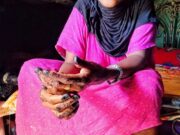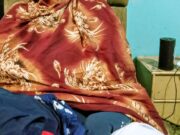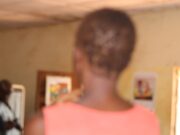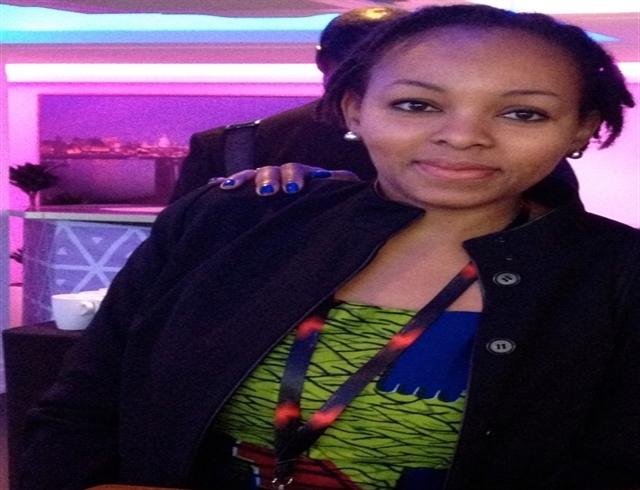Ann Wanjiku is mother to a five-month old son. While she was born and raised in Kenya, she now lives in Germany with her husband and child. She moved to Germany 12 years ago. Ann will be a regular contributor here on Mummy Tales, where she will be offering us her insights about motherhood based on her own experiences, while at the same time infusing both her Kenyan and German backgrounds.
 In her maiden post, Ann talks about the moment she learnt she was pregnant and what happened thereafter. Read on.
In her maiden post, Ann talks about the moment she learnt she was pregnant and what happened thereafter. Read on.
My pregnancy was smooth. I can’t complain. I became aware of Pumpkin growing in me after I missed my periods. They had been regular as clockwork and when they were late, I knew that I was preggers.
I however did a home pregnancy test just to confirm. I remember the day clearly.
It was on a Wednesday afternoon and after the positive results, I immediately went to see my gynaecologist even though I didn’t have an appointment. She did a scan and confirmed that I was indeed six weeks pregnant. Pumpkin was a small dot which had another dot pulsating within this bigger dot. The gyno told me that is a heartbeat and asked me if it was planned and if I wanted to keep it.
That was the first cultural shock for me! What did she mean?
In Kenya, where I grew up, we say children are a gift from God. Our public opinion is pro-life. People are not open to the issue of unwanted pregnancies and termination even though terminations do take place illegally. However, in Germany where I live, the society is liberal and it is standard procedure for a gynaecologist to ask you these questions so that you can be assisted further. If during this session where a woman is officially confirmed pregnant and she decides against keeping it, she will sent for counselling by an independent counsellor before the pregnancy can be terminated.
This official confirmation of pregnancy protects the woman from being sacked and also helps her employers to plan for her impending absence. Expectant women can be excused from work if their jobs are dangerous or involve strenuous activities for example working with chemicals, jobs that require one to stand for long hours, or do some lifting and night shifts like nurses, air hostesses, factory workers, waitresses and sales assistants. Women in those professions can be exempted from work and they would still receive their monthly salary until their maternity leave starts.
Anyway, I was given some literature on pregnancy and a prescription for folic acid and iron supplements that I was supposed to take henceforth. I was also given a small maternity booklet called Mutterpass loosely translated as “Mother’s Pass”. This booklet, which contains maternity notes about you is supposed to track the antenatal check-ups. The Estimated Date of Delivery (EDD) and results of the following tests are entered into this booklet: your blood group, the Rhesus factor, test results for Hepatitis, Rubella and STIs. However, the results for the HIV test are not written in this booklet instead you are told about your status during the next consultation.
In Germany, the gestation period is tracked in weeks as contrasted to months. Every expectant mother has to attend 12 mandatory antenatal check-ups, which involves monitoring your weight, blood pressure and urine. In addition to these 12 check-ups there are also 2 special check-ups that involve screening for anomalies: the 14th and the 20th week scans.
The 14th week scan is the Nuchal Translucency Screening (NT Screening). This scan looks possibility of the baby having Down Syndrome by looking at the amount of fluid in the baby’s neck, the nasal bone and the facial angle. This scan also checks whether the placenta is functioning as it should and if the baby is receiving enough nutrition from the mother. If the results of this scan are inconclusive the mother has an option for futher diagnostic tests like amniocentesis, which involves getting a sample of the amniotic fluid and examining it in the laboratory.
The 20th week scan enables the parents to know the sex of their child. In addition, the baby’s organs are checked and the mother is informed whether there is a need for further tests.
Eight weeks or so before birth the expectant couple is advised to attend birthing classes. The mom to be can attend these classes on her own or with her partner. The content of these classes are the birth itself, how to dress the newborn and the mother’s nutrition after birth. It is in these classes that one is advised to look for a midwife who will accompany her after birth care at home.
And that was my first pregnancy experience in Germany after taking a pregnancy test.








































[…] and the unique experiences that she continues to enjoy everyday. In her last post which you can read here, Ann talked about the moment she found out she was pregnant and what happened thereafter. Today, […]
[…] Read: Introducing Ann Wanjiku, another guest-writer diaspora mum from Germany. […]